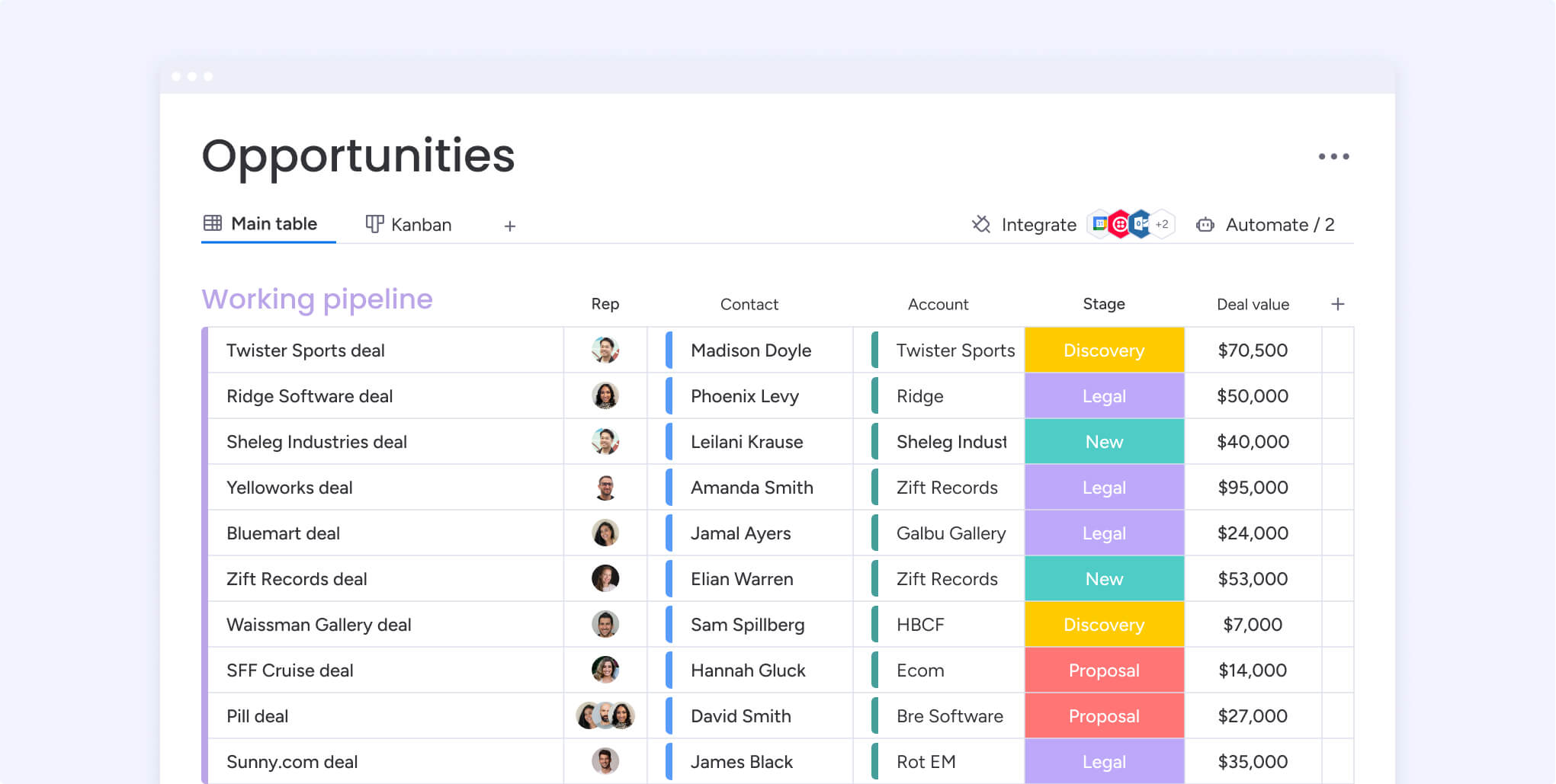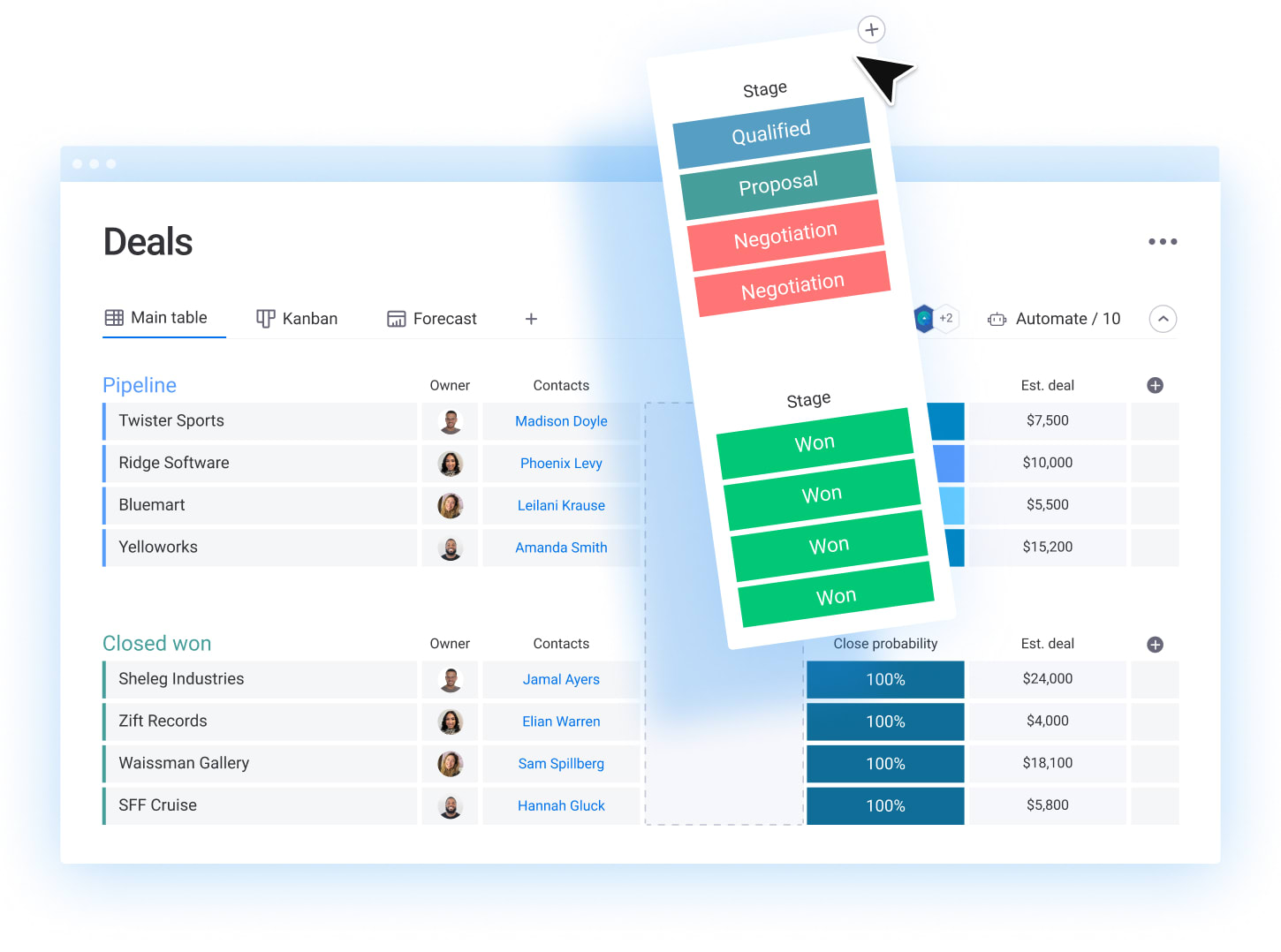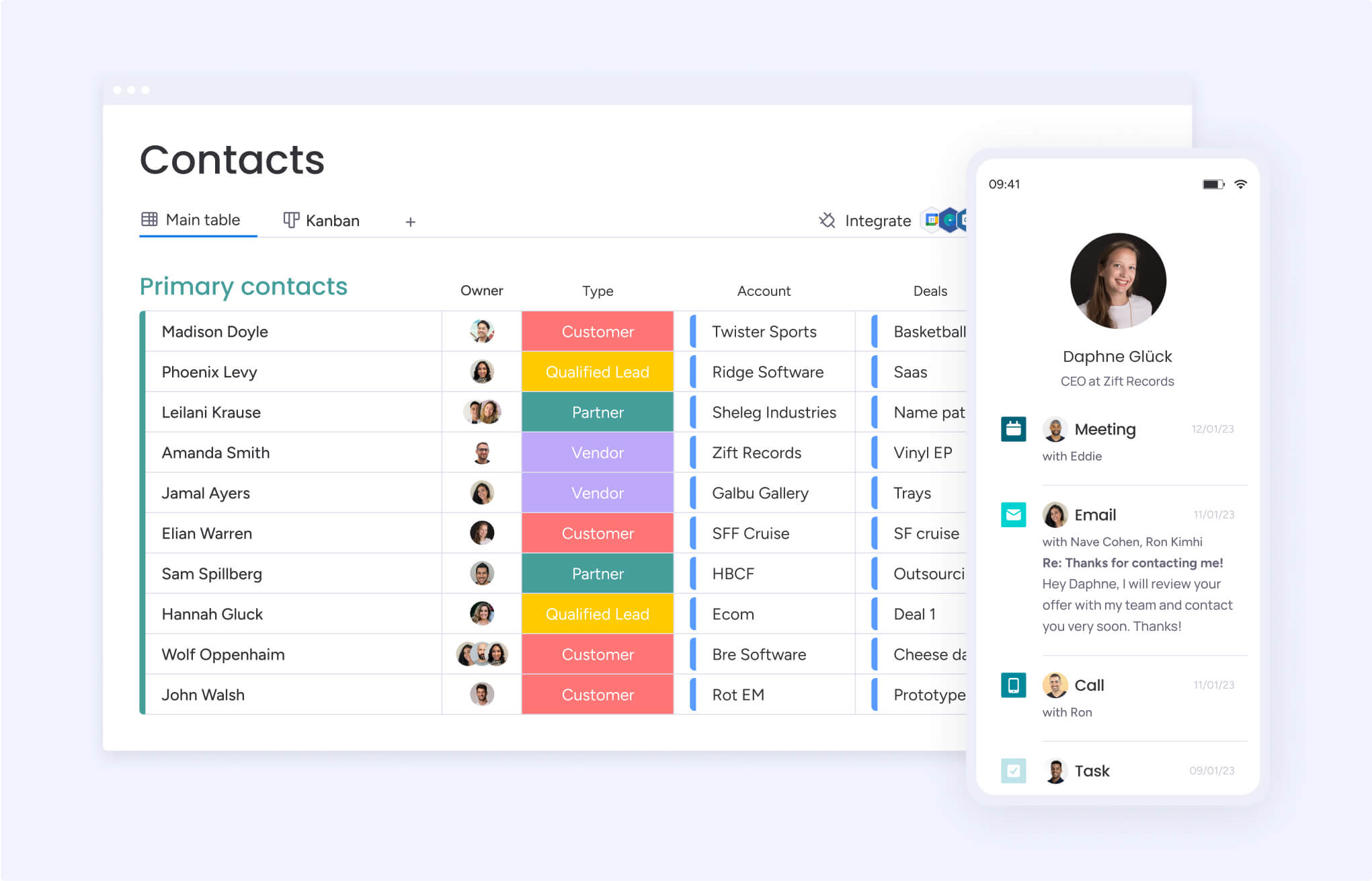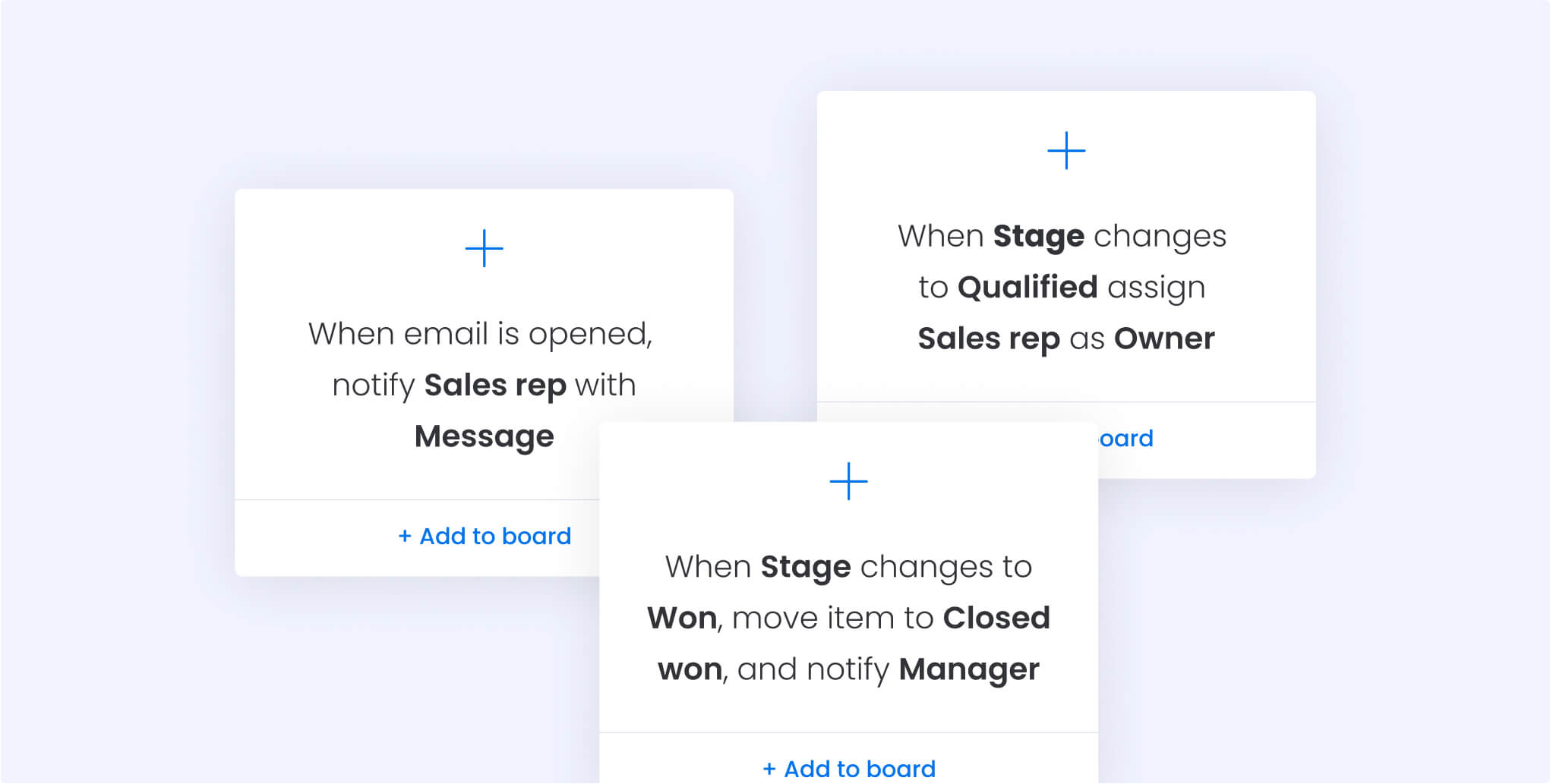When you don’t have a good sales tracking method, it’s easy to lose leads, sales, and revenue. Enter the sales pipeline: a handy structure that takes your sales process and breaks it down into visual, easily understandable stages that everyone on your team can follow.
This guide will take you through each stage of the sales pipeline so you can see how it helps your sales team run more smoothly. Plus, we’ll show you how to build and manage your sales pipeline with a sturdy CRM, like the one offered by monday.com.
Try monday CRMWhat is a sales pipeline?

A sales pipeline is a framework for the steps your leads go through on their journey to becoming paying customers. Businesses often use sales pipelines to track the progress of deals and to identify areas for improvement in their sales process. It’s like a roadmap that helps your sales team stay organized, prioritize leads, and forecast revenue.
Typically, a sales pipeline includes the stages of lead generation, lead qualification, initial contact, presentation or demo, negotiation, and closing the deal.
Why is a sales pipeline important?
The sales pipeline is the backbone of any sales operation, providing structure and visibility into the entire sales process from prospecting to closing deals.
Here’s why the sales pipeline is such a useful framework:
- It helps you organize and prioritize leads, so potential customers don’t fall through the cracks.
- It makes it easier to create accurate sales forecasts, by tracking the progress of deals through various stages.
- It makes your sales team more efficient by creating a standardized process for your reps to follow, so they’re not constantly reinventing the wheel.
- It gives you insight into the overall health of your sales process, highlighting areas for improvement and optimization.
If you’re ready to set up your sales pipeline, monday CRM could be a great place to start. Workspaces in monday CRM come loaded with pre-made boards and templates that make it super simple to set up a sales pipeline from scratch.
Try monday CRMWhat are the six sales pipeline stages?

Depending on your business structure, there can be some variation in your sales pipeline, but most sales operations will progress through the following steps:
Phase 1: Prospecting or lead generation
The first pipeline stage is all about finding and qualifying potential leads. This might be done through traditional or digital marketing strategies, PR initiatives, or traditional manual research and sales outreach.
Phase 2: Initial contact and lead nurturing
Now that you know who your prospects are, it’s time to start getting them to trust you. Prove your value early, and your conversion rate will thank you.
You can nurture your leads using all sorts of tactics — lead magnets, drip campaigns, or even cold calls or emails. It just depends on what will have the best impact on your target audience.
To keep an eye on all of your lead nurturing strategies, it’s smart to use a CRM that consolidates all your lead information in one easy-to-access place. With monday CRM, it’s simple to view the status of all your leads and deals at a glance, so you know exactly when your leads are ready to move into the next stage.
Try monday CRMPhase 3: Lead qualifying
Lead qualifying helps you to focus your sales efforts on the most valuable prospects. A qualified lead meets a certain set of criteria that indicates how likely they are to buy from you.
For instance, you might disqualify a lead when you realize they just don’t have the budget to buy your product. Sometimes this is quantified in a lead scoring system, which you can also track in your CRM software.
Phase 4: Product demo or free trial
Once a prospect has been qualified, you’ll need to show them what you can offer them. This stage may involve conducting product demonstrations, providing case studies or testimonials, and outlining the benefits of choosing your offering over competitors. The goal is to demonstrate the value of your solution and how it can solve the prospect’s problems.
Phase 5: Proposal or negotiation
This is the actual sales pitch. Everything in your sales pipeline so far has been building up to this moment. By this point, you should have built rapport and proved your value so the sales pitch comes naturally. If you’re working in enterprise sales or selling custom solutions, this stage might also include negotiations or outlining the final terms of the deal.
How do you build a sales pipeline from scratch?

If you’re ready to create a standardized sales pipeline for your team, here are the steps to follow:
1. Define your Ideal Customer Profile (ICP)
Before you can start putting together a sales pipeline, you need to agree on who you’re targeting. If you’ve already got a customer base, look at the characteristics of your best customers. If not, you’ll need to conduct market research and consider who your product or service will help the most. Factors to bear in mind include industry, company size, location, and demographic profile.
2. Identify prospecting channels
Once you’ve defined your ICP, begin to look into their behavior and preferences. Where do they spend time? What media channels do they consume? What are the easiest and most cost-effective ways to reach them? Channels to consider include cold-calling, email outreach, social media engagement, networking events, or inbound marketing.
3. Begin building a leads list
Time to start pulling leads into your pipeline. Begin gathering leads through your chosen prospecting channels. You can use tools and techniques like lead generation software, web forms, networking, and referrals to build a database of potential prospects who fit your ICP
4. Qualify your leads
Define what makes a lead a good fit for your business (your ICP should help) and use these qualifying criteria to start to sort your leads into high and low priority. Often, this involves a combination of qualifying questions (asked via webforms or during discovery calls) and analyzing how leads have engaged with your digital content.
5. Engage with prospects
Reach out to qualified leads—whether through emails, phone calls, social media, or by setting up a meeting. Make sure to track your communications in your CRM, so the whole team has the information they need to follow up appropriately.
6. Manage your opportunities in a shared platform
Use your CRM to monitor interactions, update the status of leads as they progress through the stages of the sales pipeline, and schedule follow-up activities. Regularly review and prioritize opportunities, to ensure a steady flow of prospects through the pipeline. If you’re working with monday CRM, you might also want to set up automations to keep the whole team up to speed on deal progress and cut down on manual data entry.
By following these steps and staying proactive in your prospecting efforts, you can build a robust sales pipeline that consistently generates qualified leads and drives revenue growth for your business.
Keep your sales pipeline organized with monday CRM

If you’re ready to build a high-performing sales pipeline, you might want to check out monday CRM. Our sales CRM is an all-in-one platform that helps teams build the tools they need to work at their absolute best. Sales professionals can benefit from features like:
- Automations: Take advantage of no-code automations for manual processes to give your salespeople more time for selling and less time for administrative work. For example, our built-in sales automation will automatically move sales opportunities to the proper sales stage.
- Funnel reports: Gain a better understanding of your pipeline conversion rates between different stages in the sales funnel
- Leaderboard: Visualize and compare sales rep performance within each of their deal stages to identify leaders and where to focus training efforts
- Email tools: A shared inbox, so you can share emails and activities on the person, team, or company level. Allows for additional control, security, and flexibility for your account. Plus, send mass emails easily right from the board view.
- Integrations: Manage your entire sales pipeline without switching tabs. Salesforce, Pipedrive, and many hundreds of apps seamlessly integrate with monday.com
- Customizations: With monday CRM, you can edit deal stages, add as many columns as you’d like, manage multiple pipelines at once, and more. Pick from 8+ data visualizations, custom columns, and color-coated statuses to create your ideal workflow.
Best of all, monday CRM isn’t just for your sales team. It helps marketing and support teams track their processes too. It’s a single source of truth for everyone in your organization. Why not explore how you can streamline your team’s workflow today?
 Get started
Get started 
